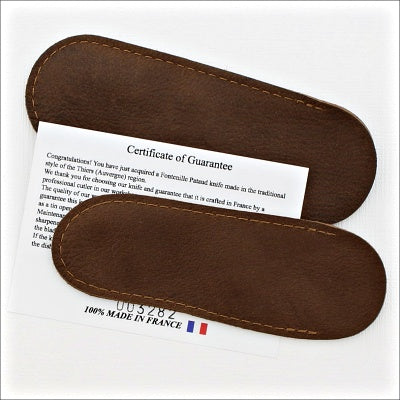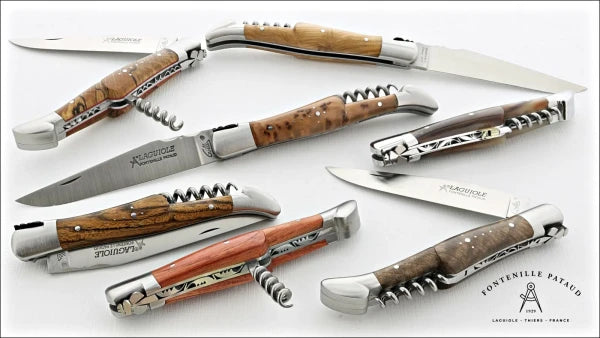FREE SHIPPING TO CANADA with $300+ USD Orders
LIVRAISON GRATUITE AU CANADA avec des commandes de $300+ USD
Note that purchases may be subject to customs fees upon delivery
Veuillez noter que les achats peuvent être soumis à des frais de douane lors de la livraison
FREE SHIPPING TO CANADA ($300+ USD)
Note that purchases may be subject to customs fees upon delivery
New Arrivals
Claude Dozorme
Fontenille Pataud Steak Knives
Table Specialties
Resources
We are trusted by some of the world best corporations. Offer your employees, customers or business partners a memorable and useful gift.
This is a Laguiole Corkscrew knife, also called a Laguiole 2 piece.
The corkscrew was added to the Laguiole knife in the 1880s. This addition resulted from the sale of corked wine bottles in urban society and in response to the request by the people of Aveyron, who had left to find work in the cafes of Paris. Café owners and waiters remained loyal to their traditions and were proud to use their 2-piece knife in the capital.
The Guilloché series features additional chiseling of the spring, liners (top & bottom), and the entire blade top edge.
This knife was entirely handmade in Europe's capital of cutlery, "Thiers." The “Gilles®” Fontenille Pataud collection of knives are considered by many to be some of the best pocket knives money can buy. All Knives offered by Gilles are entirely made by a single craftsman, ensuring pride of ownership of the final piece.100% Made in France.
Note: It's worth noting that deploying the folded corkscrew can be tricky, especially if you're new to the tool. We suggest gripping the screw from beneath and pulling firmly, rather than using your nails. And, always ensure the blade is closed when folding and unfolding the screw. Keep these tips in mind to make things smoother and safer.
What is a Forged Bee? You can recognize a forged bee when you look just below it, where it meets the decorated spring. If you do not see any gaps, it's a good sign that the bee and spring were forged from the same piece of metal. You can also recognize a soldered bee by noticing a straight gap/ridge where the bee meets the spring.![]()
A 12 cm Laguiole folding knife can be used as a steak knife; its open length is 8. 3/4" vs. ~9" for a standard steak knife. Why use such a knife at the dinner table or your favorite steak house? Check out our article (new tab) for the surprising answer.
Shopping for a unique pocket knife not only holds the promise of ownership but the excitement of finally beholding an item admired through a screen. However, all too often, what was envisioned and what is unboxed bear a startling, sometimes painful discrepancy.
You will receive the actual folding knife shown in the photos.
No one wants to view photos of a beautiful and unique knife and receive something not even close to the representative image; this is why we take pictures of each piece. Select your One-Of-A-Kind knife!
Things to Look For
The file work on the springs (top of handle) are individually hand filled by a French artisan, therefore all are different. Additionally, two handles made from the same material can have very different patterns.
You need to know
Desert Ironwood (Olneya tesota) - One of the world hardest wood and most difficult to work with due to its density.
This increasingly rare wood comes from dead trees that have been left to dry in the desert heat for decades. As it starts to fossilize, the wood turns reddish brown with a golden hue and beautiful veining. The wood from this very slow growing tree can be well over 100 years old. Harvested in Arizona or Northwestern Mexico.
Good to know: Ironwood can sometimes show tiny knots or small depressions within the wood. This is not considered a defect but rather a characteristic of this wood.
Pocket knives are shipped same business day from Florida when ordered by 4 PM Eastern time. UPS delivery can be expected in 1 to 3 business days depending on destination. International shipping options are available at checkout.
![]()

This 12 cm handle knife features a forged bee and a full-length hand chiseled spring. This knife also features a solid hardened blade stop to help prevent the blade's edge from making contact with the inner area of the spring.
Blade: Stainless Swedish 12C27 Hardness: 56-57 Hrc.
Corkscrew: 5 rings worm, 8 mm diam, hardened stainless steel. Made in Thiers- France.
Plates: 1.5 mm stainless.
Decorated Spring: 3 mm stainless - Hand file work
Blade: 9.60 cm (3.80")
Handle Size: 12 cm (4.72")
Open Size: 21.60 cm (8.50")
Weight: ~ 104 grams (3.70 oz.)
Slip Joint Closure:Learn more

Pocket Knife
Pocket Knives are designed for cutting only. Please do not use it as a screwdriver, crowbar, or wood chisel, as this can cause irreversible damage and void the warranty.
Corkscrews
Important Note on Use: Waiter-style corkscrews are designed for use with a secure grip on the bottle neck. Please do not use the tool by clamping the bottle between your knees and pulling the handle. This technique often applies excessive force, which is likely to bend the screw (worm) and will immediately void the product warranty.
To keep your pocket knife or corkscrew in top condition, follow these maintenance tips:
Important Note: Tuf Glide is not considered a "food-safe" product. Avoid using it on knives that come into contact with food.
By following these simple steps, you can ensure that your item remains reliable and ready for your next adventure.
This is a Laguiole Corkscrew knife, also called a Laguiole 2 piece.
The corkscrew was added to the Laguiole knife in the 1880s. This addition resulted from the sale of corked wine bottles in urban society and in response to the request by the people of Aveyron, who had left to find work in the cafes of Paris. Café owners and waiters remained loyal to their traditions and were proud to use their 2-piece knife in the capital.
The Guilloché series features additional chiseling of the spring, liners (top & bottom), and the entire blade top edge.
This knife was entirely handmade in Europe's capital of cutlery, "Thiers." The “Gilles®” Fontenille Pataud collection of knives are considered by many to be some of the best pocket knives money can buy. All Knives offered by Gilles are entirely made by a single craftsman, ensuring pride of ownership of the final piece.100% Made in France.
Note: It's worth noting that deploying the folded corkscrew can be tricky, especially if you're new to the tool. We suggest gripping the screw from beneath and pulling firmly, rather than using your nails. And, always ensure the blade is closed when folding and unfolding the screw. Keep these tips in mind to make things smoother and safer.
What is a Forged Bee? You can recognize a forged bee when you look just below it, where it meets the decorated spring. If you do not see any gaps, it's a good sign that the bee and spring were forged from the same piece of metal. You can also recognize a soldered bee by noticing a straight gap/ridge where the bee meets the spring.![]()
A 12 cm Laguiole folding knife can be used as a steak knife; its open length is 8. 3/4" vs. ~9" for a standard steak knife. Why use such a knife at the dinner table or your favorite steak house? Check out our article (new tab) for the surprising answer.
Shopping for a unique pocket knife not only holds the promise of ownership but the excitement of finally beholding an item admired through a screen. However, all too often, what was envisioned and what is unboxed bear a startling, sometimes painful discrepancy.
You will receive the actual folding knife shown in the photos.
No one wants to view photos of a beautiful and unique knife and receive something not even close to the representative image; this is why we take pictures of each piece. Select your One-Of-A-Kind knife!
Things to Look For
The file work on the springs (top of handle) are individually hand filled by a French artisan, therefore all are different. Additionally, two handles made from the same material can have very different patterns.
You need to know
Desert Ironwood (Olneya tesota) - One of the world hardest wood and most difficult to work with due to its density.
This increasingly rare wood comes from dead trees that have been left to dry in the desert heat for decades. As it starts to fossilize, the wood turns reddish brown with a golden hue and beautiful veining. The wood from this very slow growing tree can be well over 100 years old. Harvested in Arizona or Northwestern Mexico.
Good to know: Ironwood can sometimes show tiny knots or small depressions within the wood. This is not considered a defect but rather a characteristic of this wood.
Pocket knives are shipped same business day from Florida when ordered by 4 PM Eastern time. UPS delivery can be expected in 1 to 3 business days depending on destination. International shipping options are available at checkout.
![]()

This 12 cm handle knife features a forged bee and a full-length hand chiseled spring. This knife also features a solid hardened blade stop to help prevent the blade's edge from making contact with the inner area of the spring.
Blade: Stainless Swedish 12C27 Hardness: 56-57 Hrc.
Corkscrew: 5 rings worm, 8 mm diam, hardened stainless steel. Made in Thiers- France.
Plates: 1.5 mm stainless.
Decorated Spring: 3 mm stainless - Hand file work
Blade: 9.60 cm (3.80")
Handle Size: 12 cm (4.72")
Open Size: 21.60 cm (8.50")
Weight: ~ 104 grams (3.70 oz.)
Slip Joint Closure: Learn more

Pocket Knife
Pocket Knives are designed for cutting only. Please do not use it as a screwdriver, crowbar, or wood chisel, as this can cause irreversible damage and void the warranty.
Corkscrews
Important Note on Use: Waiter-style corkscrews are designed for use with a secure grip on the bottle neck. Please do not use the tool by clamping the bottle between your knees and pulling the handle. This technique often applies excessive force, which is likely to bend the screw (worm) and will immediately void the product warranty.
To keep your pocket knife or corkscrew in top condition, follow these maintenance tips:
Important Note: Tuf Glide is not considered a "food-safe" product. Avoid using it on knives that come into contact with food.
By following these simple steps, you can ensure that your item remains reliable and ready for your next adventure.